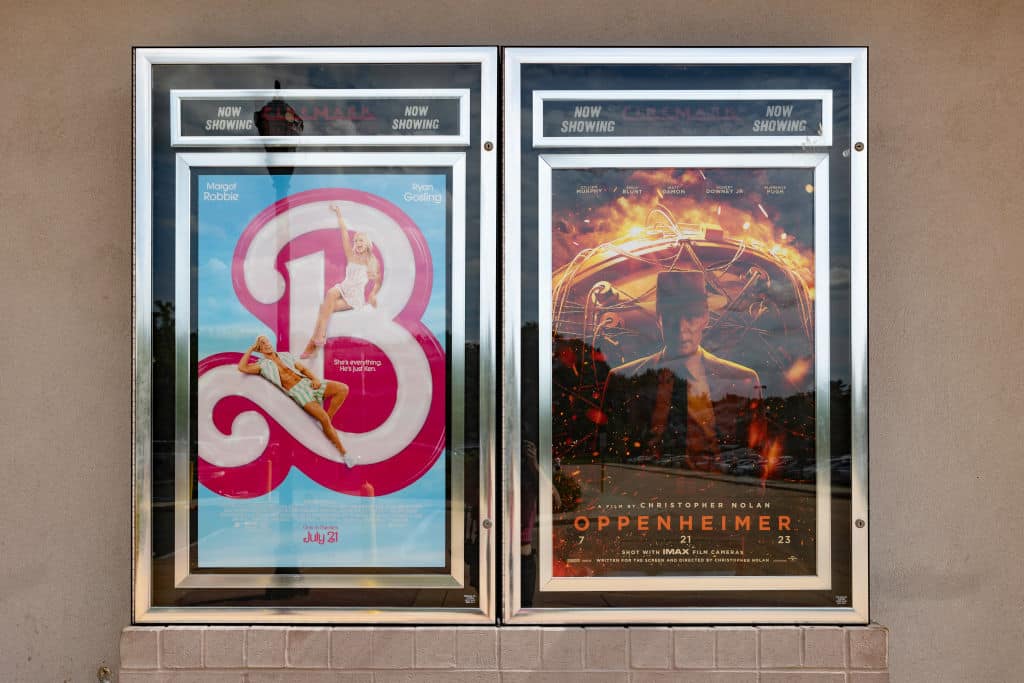Greta Gerwig’s Barbie and Christopher Nolan’s Oppenheimer are bringing audiences back to the cinemas.
‘Barbenheimer’ fever is gripping South Africa too.
The word, coined by social media users days ahead of the simultaneous release dates of Greta Gerwig’s Barbie and Christopher Nolan’s Oppenheimer, has turned the spotlight on the thumping return of the big screen, post-pandemic.
“The results for the opening weekend of Barbie and Oppenheimer were way beyond our forecasts and our expectations,” says Lynne Wylie, Chief Marketing Officer at Ster-Kinekor (network of movie theaters in South Africa), to FORBES AFRICA. “It was Ster-Kinekor’s biggest opening weekend by far in the post-Covid environment, and we are thrilled that more and more people are once again experiencing the joy of watching a film in a cinema.”
In the United States (US), ‘Barbenheimer’ generated more than $235.5 million in ticket sales, according to CNBC, on its opening weekend. Barbie smashed expectations by earning $155 million, becoming the biggest movie launch of the year and the biggest box office debut by a female director. Oppenheimer collected a reported $80.5 million, making it one of Nolan’s most-acclaimed and commercially successful films.
A full-fledged international box office phenomenon, according to Google Trends, interest in the two films also continues to soar in South Africa.
Despite being starkly different, with one being a sweetly subversive comedy starring Margot Robbie as the popular doll and the other with Cillian Murphy portraying the father of the atomic bomb, the two movies have managed to pull audiences in for an unlikely double feature.
“There’s something really fun about coming back [to the cinema], and I know our show is sold out,” Daniela Lamparelli, a member of the theater audience last weekend in Johannesburg watching Barbie first, followed by Oppenheimer, tells FORBES AFRICA. “It’s going be really fun to watch it and hear everyone’s reactions. It’s quite a nice experience to watch it in a cinema with lots of people. When cinemas are quite empty, you feel like watching movies at home.”
Much like the rest of the world, South Africa’s cinemas have struggled to get audiences back to theaters after the pandemic. According to a recent report in News24, cinema attendance at Ster-Kinekor was below 50% of 2019 pre-pandemic levels until recently. Restoring a sense of normalcy is a mountainous endeavor, given factors such as the rise of streaming giants such as Netflix, Disney+, and Showmax.
The theatrical window of exclusivity, or the time frame between when a movie is shown in cinemas and when it becomes available on streaming platforms, has also shrunk significantly. Reportedly, toward the end of the 1990s, movies would have six-month runs at theaters before they were found on other platforms. Today, a movie can be released in cinemas and streaming services on the same day.
“The pandemic and lingering economic impact are still hard felt on South Africans’ pockets, and with cheaper streaming offerings, going to the movies has become more of a luxury than ever before,” Gabi Zietsman, a film critic, tells FORBES AFRICA. “They are only willing to shell out money for the big blockbusters or films that demand to be seen on a big screen. Otherwise, they’ll just wait for it to go on streaming and save their money.”
Wylie says one of the major benefits of cinema is that you get to see the big blockbusters first as they were meant to be seen, on the big screen, which is “something no streaming platform can offer”.
“Great movie experiences, like great moments in life, live large in our hearts and minds. Watching a film in a cinema is also an interruption-free experience – you are able to be completely absorbed in what is playing out on the screen for the duration of the film.”
Power outages, or what is known as load-shedding in South Africa, are also why cinema audiences are being affected. South Africa is experiencing daily power cuts reaching up to 10 hours. Audiences aren’t willing to travel to a theater if there’s a chance that their movie-going experience will be interrupted. With mobile data, they can binge-watch multiple shows and movies on streaming platforms to their hearts’ content.
“While load-shedding has impacted our cinemas and affected some of the screening timings, the fact that we have already installed generators at 34 out of our total 44 cinema complexes around the country ensures that people can always come and watch a movie,” counters Ster-Kinekor’s Wylie. “Twenty one of these sites also have uninterrupted power supply systems installed to enable a completely uninterrupted movie experience.”
Data from IMDbPro reveals that the number of Hollywood films being released has also decreased since the pandemic. For countries like India, with a booming and thriving Bollywood industry, less overseas content to show in cinemas isn’t a major concern. But for South Africa, a small number of films are being produced locally, making the nation dependent on the US for pulling audiences back in to theaters.
For now, the ‘Barbenheimer’ effect reigns.
“This phenomenon wasn’t created by studios – it was birthed by audiences and fans organically,” Zietsman says. “That doesn’t mean we won’t ever have such a cultural event at the movies again. Audiences just want something new and different that they can participate in, like dressing up, and if it’s also critically good, then you’ve got a winner. Oppenheimer had the prestige, Barbie had the brand recognition, and everyone involved in both was just passionate about their work, and that passion is infectious.”
